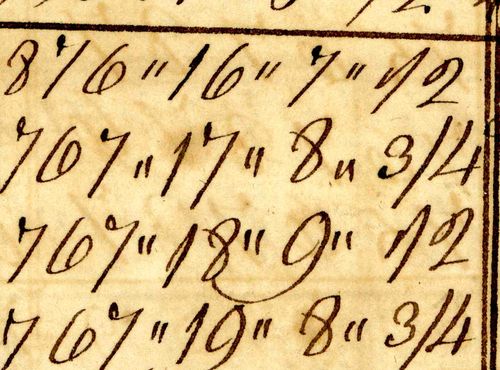JF Ptak Science Books Post 410

Perhaps the most exquisite art for me is that which is most unexpected, finding beauty without preconception, without warning; and sometimes, finding art without the reason to make it so. And sometimes it is just the innate design, spacing, placing of elements in something that makes it beautiful, the use of unused, empty space establishing the elements of micro-perfections, the punctuations of the flow of visual chance.
"Additions of Money", a page from a primer or mathematics workbook kept by a later-aged child in Pennsylvania in 1810 is filled with such found moments. The columns of numbers are just gorgeous, and the empty spaces - gauzy with the iron from the ink that has eaten its way halfway through the paper from the other side - provide just enough found geometry to suggest mystery and depth in blank space. Simple. Elegant. Unexpected. Beautiful.

Perhaps it is the aspect of self-non-similarity that is so appealing; perhaps for the fond naive art it is the rejection of sameness, of everything that something like mathematical/fractal art is not. (A fractal just for the record is a geometric shape that can be split into parts that is a smaller copy of the preceding whole.)
These are images that stochastic synthesis of fractal noises is not: it is not the Peano curve, or Sierpinski gasket, or Hilbert curve, or Mandelbrot set, or Hausdorf domain, and on and on. Perhaps it is the opposite of these things.
And this brings me to Steve Reich's "Come Out" and a question: is this music fractal? (Or Arnold Schoenberg for that matter?) There is a panoply of repeated, self-repeating themes through the work of Reich, blending themselves into magnificent compositions. But I wonder about what "Come Out', an early work by Reich, is in the same category. This composition simply uses the words "come out to show dem" ("I had to, like, open the bruise up and let some of the bruise blood come out to show them" ) in not-so-simple ways, repeating the phrase thousands of times, in the same time, but at different times, like a Zeno's paradox of music, finding the cleverly hidden beauty in a simple phrase. And precisely the opposite of our naive surreal mathematical art.




As for Come Out, it was Reich's first phasing piece; it came from his accidental discovery of phasing (he was using two tape players and one with a mechanical issue that made it play slightly slower than the other). It's very rich, but I personally don't think of it as fractal because there's no depth or layering in structural terms (only simple stagger/delay on the same 'level').
But of course it's unexpectedly beautiful, and careful listening to it gives us so much... as a random example, the harmonic sweeps you hear around 3:00 to 3:15 happen to be a nice clear analog example of what happens during flanging (so common today as a digital effect -- you've heard it countless times on the radio).
Anybody interested in Come Out will also like Piano Phase, in which he asks human musicians to phase like this (two pianists play the same passage and one keeps speeding up slightly... of course humans can't sustain this anywhere near as precisely or as long as machines can, so in Piano Phase they shift into and out of the phasing).
Thanks for sharing Come Out and that very Reich-ish manuscript!
Posted by: Kala | 05 December 2008 at 03:54 PM
"Piano Phase" was my first introduction to Steve Reich. I believe it was 1981, when I first joined this particular research group as a chemist, and I met a physicist in a related group who was playing with computers and synthesizers on the side, and he made a recording this way of Piano Phase. The computer could do what people simply could not, and it was fascinating to hear the music come out of the phasing. I'd love to find that tape somewhere ... I would not have purposely thrown it out, but I have no idea where to look. It was such a pleasure to meet this man ... he was apparently quiet and shy, but he had a profound stutter, beyond which he was fascinating. I appreciated the passion with which he pursued music this way. Anyway, shhh ... Laura's working. I'll listen to this later. Thanks.
Posted by: Jeff | 05 December 2008 at 04:32 PM
Kala and Jeff: first of all, my apologies for all of those typos, now fixed. Sloppy, sloppy. Kala, I agree with you on the Reich/fractal business. I was pretty much thinking out loud on that, and it sounded like an interesting question. And I think my answer might have been right if you didn't think about it. JEFF: fascinating story about the Early Days. That guy, the physicist, and you (I reckon) were doing some pretty early work in that area. It would be terrific if you could find that tape...
Posted by: John F. Ptak | 05 December 2008 at 08:35 PM
John, *I* didn't do any early work. I just met this guy in the coffee room and we started talking and he made me the tape and I listened to it and I enjoyed it. I suppose it was work in the sense that I was AT work and on the clock. I think of Reich sometimes when I hear certain things in the world, such as sounds moving in and out of phase. But I can't say how much he informed my appreciation of such experience. I used to listen to different beats playing off each other as a kid and get lost in it. In the least, that's probably why I enjoyed Reich when I would hear him. That reminds me ... I bought a CD of his not too long ago ... must look for it. I look for the above-mentioned tape, too.
Posted by: Jeff | 06 December 2008 at 10:26 AM
Some googling might turn up a modern equivalent of that tape... I remember when I was playing around with Max/MSP in computer music class, we would write Max patches that played the early Reich pieces Clapping Music and Piano Phase. Our aim was to reproduce them correctly (as he wrote them), but the phasing parts of Piano Phase could also be dramatically extended in a Max patch, producing a much more Come Out-like effect like I assume that physicist guy was getting.
Posted by: Kala | 08 January 2009 at 05:06 AM